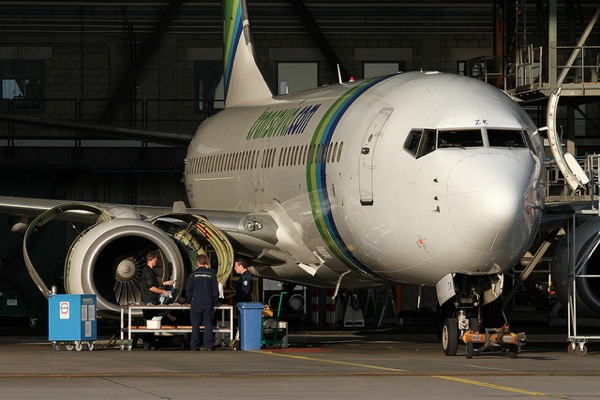Master these three essential skills to unlock sustained success in aircraft parts negotiation.
4 Shipping Tips To Save You Money On Aircraft Maintenance Planning
If you could start saving 25% of your maintenance costs right now, don’t you think you’d implement a change to make that happen?
Well, look no further, because I have a solution for you to reduce your wasteful spending around your aircraft maintenance planning initiatives.
7 Things That Annoy Aviation Buyers & What To Do About Them
Buying is hard. You deal with constant demands: maintenance, coworkers, the unknown. Now throw in an AOG and chaos ensues. Despite everything you must do, you still have babysit your suppliers. There are things your supplier does that annoys you. They're human. Let's identify these top traits and find ways to correct them...
Ask an Expert: How to Manage Your Supply Chain Efficiently with Ryan Coyne, U.S. Air Force Chief Logistics Operations
The time has come where we "Ask an Expert" questions that you all have been eager to have answered. We interviewed Ryan Coyne who is the Chief of Logistics Operations for the United States Air Force. To put it simply, he’s no joke. With a $17.5 billion dollar supply chain under his belt, we would say he knows a thing or two about managing supply chain & logistics.
Ryan leads a team of 25 who span supply chain, transportation, planning and QA professionals. If that wasn’t enough, he oversees sustainment solutions for 4500 aircraft and 1.8 million vehicles and equipment assets all over the world.
Without any more hesitation, let’s see what this supply champ has got to say.
https://www.youtube.com/watch?v=wLGoQFgOBKo
The discussion begins at 3:03 with Ryan sharing his responsibilities as the core logistics readiness officer and we quickly learn that he has been involved in supply chain for about 19½ years. That's almost 2 decades of knowing all there is to know about supply chain.
Ryan explains to us that although his team moves parts around the world they deal more with the end user. Due to the fact that he deals with maintenance group providers to even customer complaints, Ryan considers his work on the retail side of things.
Efficiency in your Supply Chain
We asked Ryan how he stays organized with such volume and at 10:02 he explains the organization of his wing and compares the ease of their system to Amazon. Below him is a wing of 25 staffers that work with 3 major commodities, which are aircraft parts, petroleum, and equipment items & parts for vehicles.
[Tweet "Effective communication is crucial to a successful supply chain"]
His staff of 25 has 3 groups below them of 100-200 folks a piece. Each team has a different role or specialty.
From their $17.5 billion dollar supply chain, $8-9 billion alone comes from aircraft parts. Ryan and his wing goes through about 5½ million customer transactions a month. That's more transactions than most companies receive in a year.
Ryan stresses the importance of taking advantage of demand patterns. Due to the fact that his wing can move inventory back and forth they skip the step of asking retail teams and do it themselves.
At 14:03 Ryan shares with us the importance of communication within his team and how having an enterprise view of their supply chain has worked for them.
Leadership & Motivation
Lastly we discussed with Ryan what he believes makes a good leader. At 20:49 Ryan shares that he looked to his coaches back in high school for leadership skills.
"I've never given an order in my entire career and I've been a commander 3 times. You know it's more of a collaboration, a coaching effort, constant huddles, making sure we have a consensus before we move forward." - Ryan Coyne
Ryan believes that if you aren't leading by coaching and collaborating then you will lose trust and your staff will do things because they have to and not because they want to.
He then goes on to explain that a leader must give people a chance to learn new skills, treat their staff calmly, with dignity, and look out for them.
At 26:45 Ryan adds that when it comes to motivating the younger generations a good leader must ask a lot of questions leading them to getting the right answer. This way they learn on their own and their time is protected.
In his line of work they don't receive bonuses but as a leader when you give associates back time, that's a bonus worth gold.
3 Incredibly Important Reliability Areas You Need To Know And Improve On
What is reliability? Since 1988 we’ve been playing the reliability game. The gamble of who to trust and what actions to take.
Today, much has changed. Everyone says and does the same boring thing, over promising and under delivering.
It’s common to run into reliability problems. It even gets to the point that some days you just want to run away.
Just ask our supply chain team.
Some days I have to peal them off the ceiling as they explode with frustration. I even have to peal myself off the ceiling some days.
Whether it’s logistics or even aircraft components, reliability is a game of chess. One wrong move and you lose time and money. With the right move you’re efficient. Time and money become your ally.
Many people talk about reliability, but unless you want to pay millions of dollars in consultancy fees, very little guides you in the right direction.
For now, let’s cover the basics…
Aircraft component reliability
The primary goal is to keep your components on wing for as long as possible. We’ll call this the dumbed down version of a much more complex issue.
At this point you’ll want to collect data and information about your aircraft components statistical analysis. This will give you valuable feedback on the data if irregularities developed in operation.
If you’re the type to geek out on this stuff, read this.
The key is to build a foundation for a component reliability program. Which ATA chapters do you have the most trouble with? Can you outsource solutions?
In order for you to answer these questions, having a firm understanding of your fleet and activity of components’ removals is very important.
[Tweet "Start slow and build your reliability program over time."]
Supplier reliability
It’s amazing how many people overlook supplier reliability.
I understand price is important, but it’s not the first or last decision. Your primary objective should be to work with people who can deliver and create the most value to you.
When you look into your supplier reliability program answer these questions to help build your foundation:
- Who answers you back the quickest?
- Which company has an account manager that responds to you any day of the week, at any time?
- Who helps you resolve issues?
- Who provides solutions in addition to just selling you something?
- Where is the greatest value for every dollar you spend?
- Who solves problems without creating more problems?
- Who do you trust?
- How do their parts look when they’re delivered? Are they in good condition and packaged properly?
Answering these simple questions will guide you to building your supplier reliability program. You’ll avoid the people that over promise and under deliver.
Logistics reliability
If turn-around-times (TAT) keep you up at night then logistics is its angry step brother.
We live in a small world where we can get anything, anywhere in a short period of time and yet complications are still extremely common.
You may have experience with high import taxes, customs delays, airlines losing your packages, shipments being bumped and re-scheduled to a later date, damage parts, and the list goes on and on.
I have found the best logistics reliability program works with someone who is easy to talk to and helps you resolve problems. It’s really that simple.
I have worked with so many freight forwarders and 95% of them give me a massive headache. I feel one coming on now. We found 3 solid partners, one for routine freight, one for small parcel and one for AOG shipments and they are the only people we’ll use.
Build your logistics reliability program around your specific needs and the ease of communication should be very important to you.
Building a reliability program around aircraft maintenance and components, suppliers and logistics will help make your hectic aviation life easier.
Start slow and start now.
Do you have reliability issues? We would love to help you. Fill out the form below and we’ll tackle this together.
The Cost Myth Debunked: Cheap Aircraft Parts Vs. Total Value Creation
Have you ever bought a cheap aircraft part and regretted it? Of course you have. Cheap prices are attractive. They look good, smell like savings and sound like a “deal."
The lower you drive individual costs the better off you’ll be, right?
Not quite...
Cheap Aircraft Parts vs. Total Value Creation
Our supply chain team felt the pain of this just recently. They were huddling to bring in a new component to replenish a specific pooling product line. We’ve had trouble in the past with this supplier but since they met our QA standards we figured we would give them another try.
We sent the $3,000 PO to the supplier. They replied and said the unit is SV not OH, despite the email string saying otherwise. We told him that’s not we agreed upon and he replied:
“I’ll have to pass on this one…” Wait, what! He’ll have to pass?
We replied and demanded him to honor his quote and he stated “This is aviation bro, it happens.”
Yes, the term “bro” was used. I can’t make this stuff up. Can you believe it, this is aviation? Not Skylink’s type of aviation (Never Forget Your Wings).
This was our fault. We decided to procure based on price instead of total value. We’re still searching for this item and will have to absorb a NE unit at 4x the cost. We would have made other decisions from the beginning if we didn’t rely on this “cheap” price. Our mistake and we now pay.
Driving down cost is a smart decision but anything less than fair market value get’s you into sticky situations.
What you can expect from “cheap” aircraft parts
The definition of cheap is "costing very little; relatively low in price; inexpensive; low-cost in comparison to market."
Now, I’m sure you knew this but with low and cheap pricing you bargain with opportunity costs. You’re giving up something else in return for cheap pricing.
From experience, these are common things you gamble with:
Reliability
Quality
Service
If cheap pricing is the way you want to go then you may see a higher occurrence of vendor problems. This means more cancellations, delays and poor customer service.
Sometimes it’s worth the gamble, but most often it’s not.
What total value is and isn't
The definition of value is "relative worth, merit, or importance."
Total value isn’t you spending 2x the market price on a particular aircraft part or using a specific supply chain partner. Total value is the return you get in addition to the price you pay for a specific product. This is calculated in many different ways but a great example is when your aircraft is undergoing a maintenance check.
When your aircraft is undergoing a maintenance check, you need to get parts to the MRO at a designated time otherwise you’ll be penalized, or worse, the aircraft will be delayed. Let’s say with every delay you’re charged $500. You could buy a cheap component for $2,500 or a fair market component for $3,500.
You risk cancellation and delays with the cheap component.
You’ll then have to resolve the problem and expedite shipping, spending more of your precious time. When it’s all over with the “cheap” aircraft parts cost will add up well over $3,500 when you consider your time and expedited shipping and even late delivery penalization costs.
Most of the time, it’s not worth the headache alone. When you go with total value upfront, you save yourself the headache after.
Remember, this doesn’t mean I recommend you buy expensive inflated components. What this means is look at everything, not just the “cheap” cost itself.
Look at reliability and service as the core benchmark to determine appropriate actions.
Have you been caught in a “cheap” price predicament? Are you looking for total value with fair pricing? Fill out the form below and let us prove to you that were not “cheap” we’re valuable.
Why No One Is Listening To You
How does it feel, being ignored? You pick up the phone and get voicemail. You email and get no reply back. You text only to be ignored. In the world of fast paced jets, communication moves at the speed of idle dirt. Dealing with aircraft maintenance supply chain partners is a chore.
 It's like babysitting a child that doesn't listen.
It's like babysitting a child that doesn't listen.
Nowadays, we have social communication mediums like Facebook, Twitter, Whatsapp, and the ancient phone, text and email. Yet, listening and communication skills are at an all time low. It's a mind numbing epidemic.
So why are people not listening to you? Why does it seem like nobody cares?
It's Not A You Problem, It's a Who Problem
When supply chain partners don't actively engage you in a conversation, it's not a you problem, it's a who problem.
It's very common to have a need and to have to pull teeth to work through a problem and find a solution. The person you should be relying on most is out to lunch with their phone turned off. They say "I-care-a-lot-about-you" but actions speak louder than words.
I'll give you a quick checklist to identify the who problem:
- They don't reply to your email for hours
- You don't have a cell phone number for them
- You leave voicemails and they never return your call
- You leave voicemails and it takes days to get a call back
- They don't accept your social media requests so you can build trust a rapport with them
- They are hard to find on the internet
- You have no way to text them
- They're never on Skype
- They don't have Whatsapp
- You can't call them after hours or on the weekends
- Every time you talk to them it always sounds like they have something more important to do
This is why we have 24/7 dedicated Account Managers.
You can contact them personally any time you want. People who we can create the greatest value for and who benefits from our solutions has entire access to their Account Manager. It's about creating a "WOW" experience.
When you're not being heard and you identify it's a who problem, look at your options and figure out another way.
The Downfall of Demands
Another big issue it the constant pressure of demands, it could be you doing the demanding or the other party.
Constant demands will have the other party running. Communicating and listening together is entirely different.
Here's a great example. We had a new customer contact us and every time we engaged them in a solution for their rotable RFQ needs, they would demand a "cheaper" price. It was never good enough and pretty soon we became disengaged. With the prices we were quoting they got 100% logistical support, 24/7 access to a dedicated Account Manager and unparalleled service.
They know that they can trust us and we do as we say. There's no having to babysit us. In this particular situation it was a matter of $100 that they demanded we come down to. It was a constant demand of lowering prices and a constant demand of shipping things faster than agreed upon.
Every time we worked with this client it was a demand. It was never collaborative.
Are demands sometime necessary? Yes, of course, but doing more demanding and less communication and collaborating gets most people nowhere.
Listening is much more productive than talking and it's a critical flaw in a lot of supply chain partners communication style. Know the who and watch out for the constant demands.
Do you feel like your constantly ignored? Do your supply chain partners have a listening problem? Well fear no more my friend. Fill out the form below and let's show you how good listening skills is done.
The Shocking Truth About Your Time And How To Save It
Have you ever sat in your office and thought about curling up under your desk and hiding? If you say no, you're not kidding anyone.

I think I can count 20 times that I've wanted to do this.
You may want to curl up under the desk out of fear. Stress has overcome you and you feel that most of your time is resting on the moon, out of your reach.
Is there such a thing as enough time?
No, especially when it comes to aircraft maintenance. You have a thousand things to do and a thousand and one people to communicate with.
Think of this:
We all know the quickest way to get from point A to point B is through a straight line. So why create a mess in the middle?
From multiple vendor shipments to hundreds of MROs to follow up with, the straight line gets out of control very quickly.
Just thinking of this makes me want to curl up under my desk right now.
The good news is this doesn't always have to be the case.
Make Your Supplier Stress and Sweat (Not Literally)
The best solution to regain your time is to surround yourself with good reliable people. If you can't rely on other people then you'll never regain control of your time.
By putting some of the burden onto your supplier, you can free up 25% of your time by creating a Just In Time agreement. You tell them what you need and when you need it on a 12 month forecast and the material arrives at your door, as needed.
What a relief!
But this takes planning and trust.
Mutual understanding will streamline your network and create an efficient supply chain. No need to feel all over the place.
Being efficient
By utilizing a Just In Time agreement with your supplier you will undoubtedly become more efficient.
Give the stress and responsibility to your supplier and give yourself more freedom to work on other important areas that you now only give 50% of your attention to.
You will have time for better focus and better results.
By creating ways to regain your time, you unknowingly increase your efficiency. Don't let your supplier sit there stress free and let you do all the work. Utilize them, partner with them and create solutions so you can make your aircraft maintenance as efficient as possible.
A relationship supported by a Just In Time agreement can only help by saving your sanity and streamlining your logistics.
P.S. If you want to know more about our JIT program and our relationship based operation, click here.
Tell me about your experiences with not having enough time in the day. Comment below.
How To Avoid Your Aircraft C Check Blues
Your aircraft C check is a big project. To most it may seem planned and straightforward but you and I know that's far different from reality.

It's not just a scheduled maintenance check. It's a group of planned undertakings that involve multiple parties, departments and partners depending on what strategy you've adopted.
While your aircraft undergoes it's C check there are many things running through your mind and just as many decisions to be made.
Who's responsible for the project? Are certain activities outsourced or is everything being accomplished internally? What about component support? Do you let the MRO supply components at inflated prices or do you supply your own? Are there contingency plans in place?
Most of these questions should be answered prior to the aircraft arriving at the maintenance hangar but it's always good to review and see what areas are causing problems.
Nothing ever goes to plan. Here are few tips to avoid aircraft C check problems:
Decision Making
Set roles and boundaries: By setting roles and boundaries, internally or externally, accountability can be achieved. This doesn't mean job descriptions, this means a collaborative effort for specific projects. Dedicate one person as the team lead.
Minimize decision making: Delegate all tasks that aren't a part of your core function and eliminate wasteful time spent on decision making to someone else.
Use a project management system: By using a project management system you can collaborate internally and with your partners in one easy interface. You'll be able to see what's getting done, where you're behind and who's taking on what role all in one place. This is also a great way to collaborate with your MROs and support partners.
Create a work flow diagram: By creating a work flow diagram you'll see what's supposed to be done at every stage of the aircraft C check process. Nothing will be overlooked.
Maintenance Support:
Utilize a component support partner: By utilizing a component support partner you'll avoid the costly inflation and labor costs MROs put on components. Your component support partner will take this specific role off your MRO, or you, and streamline the process.
Stream line logistics: A lot of money is spent shipping components from many different vendors from around the world. If you choose to use an aircraft C check component support partner, everything will be consolidated from one facility.
Maintain cost integrity: Don't let component parts inflate beyond a reasonable point, otherwise you're spending more money than necessary. Your component support partner will be able to manage this for you.
Establish trust: When dealing with anybody, make sure trust is established. The more you have trust in someone, the more you can delegate to them.
Your aircraft C check can be a stressful endeavor. Once you streamline processes, outsource specific tasks to trusted partners and avoid inflated mark-ups the less stressed you'll be.
With support you can achieve a reasonable amount of sanity.
What issues do you encounter with your aircraft C checks?
How To Delegate And Increase Your Bottom Line
Have you ever wondered why there isn't enough time in the day? From aircraft component procurement, repair orders, aircraft maintenance checks, aircraft parts supplier approval, the list seems to never stop.

There isn't enough time in the day to get everything done by yourself.
It's natural, human and you shouldn't beat yourself up over it. Sometimes I look at my calendar, then my daily task list and want to scream.
I know exactly how you feel, but the solution is right in front of you.
Delegation
You've probably heard of this term before but we all too often ignore it.
[dropshadowbox align="center" effect="lifted-both" width="400px" height="" background_color="#537ec2" border_width="1" border_color="#dddddd" ]"The act of empowering to act for another and or a group of persons chosen to represent others."[/dropshadowbox]
Delegation is a tool you can use to take advantage of focusing on the bigger picture and getting results, rather than the tedious work of buying hundreds of components for an aircraft maintenance check.
Imagine this:
You have 100 parts to procure and you'll need to purchase, repair, ship and receive in these 100 parts. You can take on these tasks by yourself, completing each and every step from start to finish (I know it already sounds stressful).
Or you can delegate these tasks to a trusted partner, like your aircraft parts supplier. They can do everything. You just have to sit back and receive the items in as they arrive.
They key here is trusted partner
Utilizing this concept of delegation allows you to focus on other areas. Think about how much time it costs you to follow-up and manage 100 purchase orders.
The costs get daunting don't they?
Why Would You Ever Choose Delegation?
Delegation gives you the freedom to focus your skill sets in more areas. You don't have to drown in daily tasks. The more tasks you have the more likely something will get overlooked.
Being able to delegate tasks makes you more efficient and the more efficient you are the more money you'll save.
And just between you and me, the more time you have for yourself the less stressed you'll be.
How To Start Delegating With Your Aircraft Parts Supplier
This step is simple.
Call, email and / or Skype your aircraft parts supplier and tell them that you would like to discuss delegating the component procurement process.
State what you're looking for, your needs and how you expect things to be done.
As projects get underway keep an open line of communication so they know exactly what you want. As time passes you will begin to feel the weight lifted off your shoulders and put directly on theirs.
Which is a good thing!
Delegating can be scary at first. Whether you're delegating tasks to an aircraft parts supplier, or a colleague, it will feel odd at first. However, I speak from experience when I say delegating is a HUGE relief.
You can't expect to do everything. It's not fair to you. If there are people who can help, use them. They just may have more experience in a given area and may be better for the task, whatever it may be.













